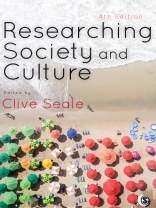Written by internationally renowned experts, each chapter provides a full introduction to a key aspect of research methodology. From starting out to generating, analysing, and presenting data, this new edition covers foundational concepts in social research while also keeping students on the pulse of topics like digital social research, social surveys, and big data. Packed with international examples from across the social sciences, it shows how to interpret and work with data generated from real-world research.
It gives you the tools to:
- Design the right research question for your project
- Access, understand, and use existing data
- Effectively write up projects and assignments
- Be confident in the A to Z of the research process
Supported by an interactive website with videos, datasets, templates, and additional exercises, this book is the perfect hand-holder for any social science student starting a methods course or project.
Table of Content
Chapter 1: Introduction and guide to using this book – Clive Seale
Part 1: Starting out
Chapter 2: Philosophy, politics and values – Clive Seale
Chapter 3: Research and theory – David Silverman
Chapter 4: Ethics and social research – Suki Ali and Moira Kelly
Chapter 5: Doing a literature review – Duncan Branley, Clive Seale and Thomas Zacharias
Chapter 6: Research questions and proposals – Moira Kelly
Chapter 7: Research design – Clare Robinson and Clive Seale
Chapter 8: The dissertation – Chetan Bhatt
Part 2: Generating data
Chapter 9: Sampling – Clive Seale
Chapter 10: Questionnaires and interviews – Clive Seale
Chapter 11: Questions, measurements and structured observation – Clive Seale
Chapter 12: Qualitative interviewing – Bridget Byrne
Chapter 13: Focus groups – Fran Tonkiss
Chapter 14: Doing ethnography – David Walsh and Clive Seale
Chapter 15: Grounded theory – Clive Seale
Chapter 16: Doing historical and documentary research – Ben Gidley
Chapter 17: Combining qualitative and quantitative methods – Neil Spicer
Chapter 18: Digital Social Research – Clive Seale
Part 3: Doing Analysis
Chapter 19: Preparing data for statistical analysis – Clive Seale
Chapter 20: Analysing single variables – Clive Seale
Chapter 21: Bivariate analysis – Clive Seale
Chapter 22: Causal arguments and multivariate analysis – Clive Seale
Chapter 23: Secondary analysis – Clive Seale
Chapter 24: Content and text analysis – Clive Seale and Fran Tonkiss
Chapter 25: Finding themes in qualitative data – Carol Rivas
Chapter 26: Visual analysis – Suki Ali
Chapter 27: Discourse analysis – Fran Tonkiss
Chapter 28: Analysing conversation – Tim Rapley
Chapter 29: Narrative analysis and interpretative phenomenological analysis – Ann Griffin and Vanessa May
Part 4: Writing, Presenting, Reflecting
Chapter 30: Writing a research report – Carol Rivas
Chapter 31: Giving oral presentations – David Silverman
Chapter 32: Research quality – Clive Seale
About the author
Clive Seale has been Professor of Sociology (or Medical Sociology) at Goldsmiths and Queen Mary’s (both University of London) and Brunel University. His work has concerned communication in health care and death in modern society. He has published extensively on research methods. His books include Constructing Death: the sociology of dying and bereavement (Cambridge University Press, 1998), The Quality of Qualitative Research (Sage, 1999), Media and Health (Sage, 2003) and Gender and the Language of Illness (Palgrave-Macmillan, 2010, with Jonathan Charteris-Black). Recently, he has turned to fiction, publishing a novel, Interrogating Ellie (Cloiff Books, 2015) using the pen name Julian Gray. He is currently writing another novel.












